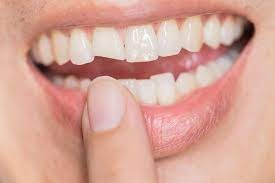Wisdom teeth are the last molars to emerge, usually appearing in your late teens or early twenties. These teeth can often cause various dental issues due to limited space in the mouth or improper growth. One common and painful problem is a wisdom tooth chipped either from biting something hard, decay, or natural wear. When this happens, discomfort, sensitivity, and infection can follow if left untreated.
In this guide by dental advice today, we’ll explain why chipped wisdom teeth hurt, what symptoms to look out for, and the best ways to treat and prevent the problem.
What Happens When a Wisdom Tooth Gets Chipped?
A chipped wisdom tooth means that a small or large part of the enamel — the hard outer layer — has broken off. Since wisdom teeth are located at the back of your mouth, it’s easy for damage to go unnoticed at first. However, even a minor chip can expose the softer inner layers of the tooth, including the dentin or pulp, which contain nerves and blood vessels.
When the pulp is exposed, bacteria can enter and cause inflammation, leading to pain, swelling, and even infection.
Common Causes of a Chipped Wisdom Tooth
Several factors can cause your wisdom tooth chipped or cracked, such as:
- Biting Hard Foods – Chewing ice, nuts, or hard candy can crack the enamel.
- Tooth Decay – Cavities weaken the tooth, making it more likely to chip.
- Bruxism (Teeth Grinding) – Chronic grinding can wear down enamel and cause fractures.
- Trauma or Injury – A fall or a blow to the jaw can chip a wisdom tooth.
- Eruption Problems – Partially erupted wisdom teeth are harder to clean, leading to decay and weakening.
Symptoms of a Chipped Wisdom Tooth
You may not notice the chip immediately, but as time passes, the following symptoms can develop:
- Sharp pain when chewing or biting
- Sensitivity to hot or cold foods
- Swelling or redness in the gums
- Bad breath or a foul taste from trapped food
- Difficulty opening the mouth
- Visible crack or missing piece on the tooth
If any of these symptoms appear, it’s important to consult a dentist as soon as possible to avoid further complications.
Why Does It Hurt So Much?
Pain from a chipped wisdom tooth occurs because the inner layers of the tooth are exposed. The pulp contains nerves that react strongly to temperature changes, pressure, or bacteria.
In some cases, the pain might radiate to nearby areas, such as the jaw, ear, or neck, making it difficult to pinpoint the exact source. If infection sets in, the pain can become throbbing and severe — sometimes accompanied by fever or swollen lymph nodes.
When to Visit a Dentist
Not every chipped tooth causes immediate pain, but a wisdom tooth chipped can worsen quickly due to its position in the mouth. You should seek professional help if you experience:
- Persistent toothache or sensitivity
- Bleeding gums or pus near the tooth
- Swelling in the jaw or cheek
- Pain that spreads to the ear or temple
At dental advice today, we emphasize that prompt dental care can save you from severe pain and costly treatments later on.
Treatment Options for a Chipped Wisdom Tooth
The right treatment depends on how badly the tooth is chipped and whether there’s an infection. Here are the most common solutions your dentist may recommend:
1. Dental Bonding or Filling
For minor chips, a tooth-colored resin can be used to restore the shape and protect the inner layers from bacteria and sensitivity.
2. Crown Placement
If a large portion of the tooth is missing, your dentist may fit a crown over it to restore strength and function.
3. Root Canal Therapy
If the pulp is infected or exposed, a root canal may be necessary to remove the infected tissue and seal the tooth.
4. Tooth Extraction
When the wisdom tooth chipped severely or is impacted, extraction might be the safest and most effective solution to prevent pain and infection.
Home Remedies for Temporary Relief
While waiting to see a dentist, you can try these simple remedies to manage the discomfort:
- Rinse with warm salt water – Helps clean the area and reduce swelling.
- Use over-the-counter painkillers – Ibuprofen or acetaminophen can help ease pain temporarily.
- Apply a cold compress – Reduces swelling and numbs pain.
- Avoid hard or sticky foods – Stick to soft foods to prevent further damage.
- Keep your mouth clean – Gently brush and floss to remove trapped food particles.
Remember, these remedies only provide short-term relief. They do not replace professional dental treatment.
Key Points to Remember
- A wisdom tooth chipped can cause sharp pain and infection if ignored.
- Decay, grinding, or biting hard foods are common causes.
- Early dental intervention prevents complications like abscesses or gum disease.
- Professional treatments include bonding, crowns, root canals, or extraction.
- Temporary relief is possible with salt rinses, painkillers, and soft foods.
Prevention Tips for Stronger Teeth
To reduce the risk of chipping your wisdom teeth or any other teeth, follow these preventive steps:
- Maintain Good Oral Hygiene – Brush twice daily and floss regularly.
- Avoid Chewing Hard Objects – Ice, pens, and bones can damage enamel.
- Wear a Mouthguard – Especially if you grind your teeth at night.
- Visit Your Dentist Regularly – Routine checkups help detect cracks early.
- Stay Hydrated and Eat Calcium-Rich Foods – Keeps enamel strong and healthy.
Final Thoughts from Dental Advice Today
A wisdom tooth chipped may seem like a small issue, but it can lead to serious dental problems if not treated on time. The key to fast recovery lies in early diagnosis and proper care from a dental professional.
At dental advice today, our goal is to help you understand your oral health and make informed decisions about treatment. Whether it’s dealing with tooth pain, gum infection, or wisdom tooth concerns, timely action and preventive care can save your smile — and spare you unnecessary discomfort.






